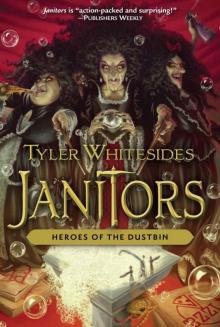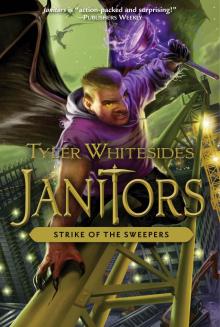- Home
- Tyler Whitesides
The Thousand Deaths of Ardor Benn Page 14
The Thousand Deaths of Ardor Benn Read online
Page 14
Hence, the cruel conundrum.
Another way to resolve the situation would be for the Agrodite spiritual leaders to change their view of the Fajumar. Considering the saltwater soak to be a practice of health, and not a religious ritual, would remove the stumbling block between Trothians and Wayfarism.
It was a suggestion Halavend had once made to Lyndel. To his surprise, she was adamantly opposed. The inseparability between Agrodite ritual and Trothian well-being was what gave her people their culture. Take that away, and Lyndel feared that the Trothians would soon be little more than blue-skinned Landers.
Halavend lifted one corner of the desk and heaved it a few inches to the side. The smooth wood dug into his fingers, and the weight of the desk made them tingle. When had he gotten so fragile? Moving the desk was as taxing an activity as he ever tackled anymore.
Halavend knelt slowly, using the chair to brace himself as his knees cracked in protest. He seized the edge of the rug, usually pinned to the floor by the legs of the desk, and whisked it aside.
Beneath the rug was a wooden trapdoor. Lyndel had helped him install it, once they decided that her visits to the Mooring would be a regular thing. A small, contained detonation of Blast Grit had blown a hole in the stone floor, Silence Grit to cover the sound.
Isle Halavend withdrew. He didn’t have the strength to pull open the trapdoor today. Besides, Lyndel would have an easy time pushing it open from below.
He rocked back on his knees for a moment, summoning the strength to rise. Trapdoors and secret meetings. Was he really the heretic Ardor Benn had accused him of being?
In the three and a half cycles that had passed since hiring the criminal, Halavend had met with Ardor a handful of times. The ruse was already costing more than anticipated, and Halavend worried that his secret withdrawals from the Islehood Treasury would soon be noticed.
Perhaps Ardor would hasten his work if he knew what consequences awaited failure. But Halavend couldn’t tell him of his plans with the Visitant Grit, despite the young man’s pressing questions. Ardor needed to hurry, but a few more cycles shouldn’t matter. The latest census still counted thirteen sow dragons on Pekal.
Halavend was still on his knees when a soft tapping sounded at the trapdoor. “It is safe, Lyndel.” His voice was raspy. It was past noon. Was that his first utterance of the day?
The wooden door lifted, and Lyndel’s face appeared, that dark blue skin blending into the shadows. She boosted her thin form through the opening, gently closing the trapdoor as she slid out from under the desk.
She really wasn’t much younger than he was. Amazing what an extra decade could do to a man. Yet, Halavend had a hard time imagining Lyndel so fragile, even ten years from now. Perhaps fifty years at a desk in the Mooring had not treated his body kindly.
“How is the tunnel holding up?” Halavend asked.
The hidden passageway was one of the outdated, original aqueducts built to deliver water into the Mooring. Most had collapsed over the years, but the one running under Cove 23 had been navigable.
“Last cycle’s rain was not good for the tunnel.” Lyndel rose, taking Halavend by the arm and helping him up. “We hope it does not rain like that again.”
It was now the Seventh Cycle, and it had been an unusually wet autumn. The fast-approaching winter weather could present problems. Heavier rains, winds, and erosion. So long as the tunnel didn’t collapse while Lyndel was down there. Halavend couldn’t bear losing another soul in this venture.
“You should sit,” Halavend offered. “Have a drink. We have much to discuss.” He had been in the cove for hours already, and the Light Grit torch on the wall was growing dim, sustained only by Prolonging Grit.
“You have found the answer?” Lyndel seated herself on the bench, taking a sip from the mug of salt water he had prepared for her. So strange, the Trothians’ ability to drink water directly from the sea. Halavend liked providing the refreshment for her, just as she liked to occasionally bring him a new quill or scribing charcoal. These little offerings celebrated their differences, and the desperation of their study reminded them that they weren’t so different after all.
“No real answers yet.” Halavend shook his head. At times it felt as though any search into the matter was an utter waste of time. For centuries, scholars and Isles had hypothesized about why Visitant Grit worked for one, and not for another. What hope did Halavend have to prove what no one else had been able to?
Lyndel.
She had changed everything, from that first time she approached him in the Char with a plea to document her religion. Comparing Wayfarism and Agroditism had already led them to one terrifying discovery. Perhaps it could also provide the answer they sought regarding the Paladin Visitants.
“In the history of the Greater Chain, there are only sixty-eight recorded instances in which Visitant Grit was successfully detonated,” said Halavend, pointing to the paper he’d been writing on.
“How many failures?” Lyndel asked. She was always full of questions that inspired Halavend to dive deeper and search harder. It was one of the things he enjoyed about her company. Especially now that Isless Malla was gone.
“Possibly hundreds more,” said Halavend. “Of course, the failed attempts are not nearly as well documented. Merely the location and basic events surrounding the failure. The Prime Isle selects only the most worthy to receive Visitant Grit. A failed detonation does not reflect well on the Islehood.”
“Do you believe that it is worthiness?” Lyndel asked.
Halavend sighed. He wasn’t sure what to believe anymore. What was worthiness? According to Wayfarism, it was determined by both action and belief. A worthy Wayfarist was one who believed that the Homeland existed. That the Homeland could inspire and Urge the island dwellers to one day return to their true land.
A worthy Wayfarist was constantly changing and improving, understanding that they were lost and far from home. They limited their association with nonbelievers—Settled folk—and did what they could to help other Wayfarists. Was such worthiness truly what qualified someone to successfully detonate Visitant Grit?
“I’ve compiled information about the people who created the successful detonations.” Halavend changed the subject. He didn’t want to answer Lyndel’s question about his beliefs on the matter of worthiness. Certainly, other factors were at play. More quantifiable factors.
“Here, I’ve notated the name, age, gender, religion, and location of each detonation. The only column that correlates perfectly is ‘Religion.’ All sixty-eight successful detonations were done by Wayfarists.”
“Of course,” said Lyndel. “Your Islehood has always controlled fertilized dragon shell.”
“Not always.” Again, Halavend was amazed at the loss of history among the Trothians. Without a written language, their version of history was full of inaccuracies. Songs and oral poems were impactful, but the meaning could easily be altered from generation to generation.
“The first recorded summoning of a Paladin Visitant occurred in 745. That’s discounting several that supposedly happened before written history,” Halavend explained. “But it wasn’t until 748 that the kings of Dronodan, Talumon, Espar, and Strind all agreed to allow Prime Isle Kleyton to sanctify the shell as an official Wayfarist proprietary. That was long before the Regulation, so the armies of the kings swept the islands and claimed any sizable pieces of shell.”
“The Trothian islets as well?” Lyndel asked.
Halavend nodded. “History refers to it as the Sanctification of 748. A holy war that lasted nearly two years. But with the full muscle of the Greater Chain behind the movement, the Trothians had little hope in resisting. All known fragments of shell were claimed, and the Islehood has had exclusive rights to it since.”
Isle Halavend tapped his scribing charcoal lightly on the desk. “But that leaves a window of three years from the time the Visitant Grit’s power was discovered until it came under Islehood control. Documentation was so poor that we c
annot possibly know the results of them all. It’s possible that Settled folk—even Trothians—could have succeeded during that time.”
Halavend wasn’t considering the two years of Trothian resistance that followed the Sanctification. Even if the armies had failed to possess all significant fragments of shell, it was unreasonable to think that a Trothian could have processed it into Visitant Grit. Lyndel’s people had never had factories of their own, and it wasn’t until the tenth century that Trothians were able to obtain limited permits to access Pekal and use Strind’s factories.
“So, possibly it is not the worthiness of the man that brings the Fire Walkers,” said Lyndel. That was a literal translation from the Trothian Kram Udal. Halavend actually found it a fitting description for the Paladin Visitants.
Lyndel was polite to even consider his religion’s beliefs. Wayfarism claimed that the Paladin Visitants were holy beings sent to protect mankind from destroying itself. Agroditism preached that the Kram Udal were actually dragons, condescending to take human form, and inflicting punishment against any who saw them.
“It’s possible,” said Halavend. “But looking at the documented facts, all we know is that every successful detonation has been performed by a Wayfarist. In every instance, the one who detonated the Visitant Grit was hand selected by the Prime Isle to use it in dire need.”
“What were these needs?” asked Lyndel.
“Do you recall that verse from the first volume of Wayfarist Voyage?” asked Halavend. He quoted the short passage. “‘Behold, the Homeland sendeth those fiery figures. Those Paladin Visitants, who alone can save mankind from its own annihilation. In the day of their coming, mankind is transported as one. As a flock of birds upon the wind, drawing ever closer to that Homeland blessed.’” He glanced up at Lyndel over the rim of his spectacles.
“I remember it,” Lyndel said.
Of course she did. They had certainly discussed it many times. The idea that a Paladin Visitant had the power to save mankind from annihilation had been the primary motive behind hiring Ardor Benn to procure the Visitant Grit. Halavend had to believe that there was much more to the Paladin Visitants than their ability to decimate entire armies with their presence.
“So the Prime Isle authorizes a hero to detonate the Grit in an effort to preserve mankind?” Lyndel clarified, proving that she not only remembered the verse, but understood its meaning. “Then, if not the worthiness of the person, possibly it is the worthiness of their task?”
Halavend scratched his silver head. He had been wondering the same thing.
“How does your Prime Isle select a person to handle the Grit?” asked Lyndel.
“It depends on the situation,” said Halavend. “Visitant Grit is only authorized on rare occasions, when there is a task requiring special help. Take a Wayfarist Voyage, for example.
“Every few years, the most devout Wayfarists receive an Urge from the Homeland,” Halavend explained. “This ultimate sign of devotion is a journey. Back to the Homeland. Away from the islands.”
“That is a death trip,” said Lyndel. “There is no life beyond the sea.”
“That is a matter of faith,” Halavend answered. “Regardless, a ship full of faithful Wayfarists sails away. Although none have returned, we assume the journey to the Homeland is perilous. For each Voyage, the Prime Isle traditionally selects one person to carry a pot of Visitant Grit. The Grit is to be detonated if unmanageable hardships befall the ship.”
“And these detonations have worked?”
Halavend shrugged. “No one has returned to let us know. But we believe they have worked. We believe their feet have once again touched the Homeland. That is ultimately the purpose of a Paladin Visitant. To see that mankind can survive to be brought closer to the Homeland.”
“These are stories of faith and belief,” said Lyndel. “Impossible to study.”
“True,” said Halavend. “Which is why we should focus on the documented occurrences.”
He had the books on the desk before him. Several passages were fresh in his mind. Isle Halavend reached out and opened Wayfarist Voyage, Vol. 7. His fingers flipped across the pages until he found the section.
“In this passage, year 958,” Halavend explained, “there was an uprising on Talumon. The insurgents were a violent band of Settled souls, making significant advances toward capturing the city Helizon. The Prime Isle authorized an army captain, a worthy Wayfarist woman named Phenro, to take a hundred warriors and a pot of Visitant Grit to put down the rebellion.”
Isle Halavend squinted at the page through his spectacles and began to read. “‘And fifty of her hundred men had fallen at the city gate, when Phenro dashed the clay upon the earth. Summoned from a bygone place, he came cloaked in fire and glory. A Paladin Visitant as a bonfire within the cloud. And the enemy was brought down as dry wood burns to ash.’”
The account of Phenro was like many other successful Visitant Grit detonations. The Paladin had come in battle. Throughout history, before the islands had been united, successful summonings had caused entire kingdoms to rise or fall. In times when the Greater Chain had been united, the Paladins had given aid in quelling rebellions and decimating gangs of anarchists.
Their assistance was always significant, of a sort that changed the course of the future. But for every successful detonation, there were a hundred failed attempts.
Captain Oriar was perhaps the most notable failure. Had he managed to summon a Paladin Visitant, Oriar could have stopped Grotenisk from razing all of Old Beripent. Was that not as worthy a cause as quashing a group of violent insurgents on Talumon?
“Phenro was considered worthy,” Halavend said. “And her cause of keeping the kingdom’s peace goes without question. But there are other passages that cause me to doubt. Instances where a Paladin Visitant has appeared for less worthy a cause.”
He opened to a bookmarked page in the third volume of Wayfarist Voyage. “An excerpt from the Conquests of Jendair,” Halavend prefaced. “He successfully summoned a Paladin Visitant in the year 892, while forcing a colony of Trothians from a small islet north of Dronodan.” He adjusted his spectacles and read aloud.
“‘The Paladin came as a flame from a dragon’s throat, resplendent, his figure bathed in fire. The fury of a bull was his voice, and all who heard him speak perished at the words. Swept from the islet were the unknowing Trothians, burned asunder at his glorious coming.’”
Halavend closed the book. “Jendair did not perish,” he continued. “He and his soldiers had prepared for the Paladin Visitant with plugs for their ears, and masks for their eyes. The regent queen of Dronodan later returned the islet to the Trothians, but hundreds had already lost their lives.”
“Why did this Jendair attack?” Lyndel asked. “Was that before the treaty?”
“There has always been one treaty or another among our people,” Halavend said. “It would seem treaties are made to be breached. In this case, Jendair was attempting a conquest at the Urgings of the Homeland. His success with the Visitant Grit would imply that his cause was a worthy one.”
Halavend paused. He had felt the Urgings many times. But he didn’t believe that the Homeland would inspire progress through conquering and bloodshed, even if the decimated people were Settled Trothians. Perhaps history had scribed something wrong about the purpose of Jendair’s conquest. Or perhaps the Homeland Urged differently now than it did in times gone by.
“What do you think?” Lyndel asked.
Halavend pushed the book away from him. “I think history is what we have interpreted it to be. The Islehood has been the only consistent organization to keep records. It is impossible to see what truly happened without viewing it through the lens of Wayfarism.”
“Is that not the lens we need?” asked Lyndel. “Wayfarists are the only ones who have successfully summoned Fire Walkers. You must consider that when selecting the right person to ignite the Grit from the Royal Regalia.”
Halavend was impressed by Lyndel’s ab
ility to set aside her own beliefs if the evidence led her in a different direction. It was one of the primary reasons he trusted her so much. What had begun as a religious dictation project had turned into something so much bigger. Lyndel kept crawling through that dark tunnel because she believed that the preservation of her people was more important than her own life. Lyndel kept staring over Halavend’s shoulder at text she couldn’t see, because she was committed to the research and understood the true scope of what the two of them were doing.
What were they doing? At times it felt like nothing more than chasing their own tails. Halavend felt suddenly discouraged by the stacks of books and parchments on the desk. What did they contain that would actually help? It was a fact that Wayfarists were alone in their summoning success. But that had to be due to the fact that only Wayfarists were given the opportunity to detonate Visitant Grit. Was it a matter of worthiness or probability?
“Possibly it would serve us to study the most recent detonations,” suggested Lyndel.
“It has been forty-three years since even an attempt has been made.”
“What does that mean?” Lyndel asked. The facts were rarely enough for her. She pushed him to find a reason. “Has there been less need for Fire Walkers?”
“Pethredote’s reign has brought tremendous peace and prosperity. Not to mention a renewed religious vigor toward Wayfarism. In many ways, there hasn’t been a need for Visitant Grit. But even if there had been, Prime Isle Chauster couldn’t authorize it. There is no more dragon shell. And without that, there can be no Visitant Grit.”
“Who was the last to successfully detonate the Grit?”
“King Pethredote,” answered Halavend. “In 1204.”
“Then possibly we should study him. What kind of man is Pethredote?” asked Lyndel. “Or rather, what kind of man was he forty-two years ago when he detonated the Visitant Grit and took the throne?”

 The Wishmakers
The Wishmakers Heroes of the Dustbin
Heroes of the Dustbin Curse of the Broomstaff
Curse of the Broomstaff The Thousand Deaths of Ardor Benn
The Thousand Deaths of Ardor Benn The Last Lies of Ardor Benn
The Last Lies of Ardor Benn Janitors
Janitors Strike of the Sweepers
Strike of the Sweepers Magic's Most Wanted
Magic's Most Wanted The Wishbreaker
The Wishbreaker![[Janitors 04] Strike of the Sweepers Read online](http://i1.bookreadfree.com/i/03/24/janitors_04_strike_of_the_sweepers_preview.jpg) [Janitors 04] Strike of the Sweepers
[Janitors 04] Strike of the Sweepers Janitors: Secrets of New Forest Academy
Janitors: Secrets of New Forest Academy![[Janitors 01] Janitors Read online](http://i1.bookreadfree.com/i2/04/05/janitors_01_janitors_preview.jpg) [Janitors 01] Janitors
[Janitors 01] Janitors